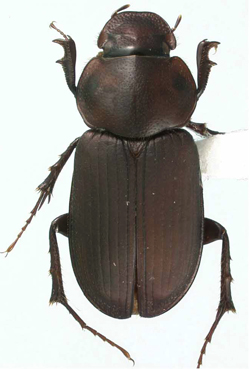| ... |
Scarabaeoidea of Southern South America Links
|
.
Keys |
|
|
| . |
| . |
Scarab Guide Links
(goes to the University of Nebraska
web site) |
.
Classification |
|
|
| . |
| . |
| . |
| . |
| . |
| . |
| . |
| . |
| . |
| . |
| . |
| . |
| . |
| . |
| . |
| . |
| . |
| . |
| . |
| . |
| ... |
| . |
| . |
| . |
| . |
| . |
| . |
| . |
| . |
| . |
| . |
| . |
| ... |
| ... |
| . |
| . |
| . |
| . |
| .. |
| . |
| . |
| . |
| . |
| . |
| . |
| . |
| . |
| . |
| . |
| .. |
| . |
| . |
| . |
| .. |
| ... |
| . |
| . |
| . |
| . |
| . |
| . |
| . |
| . |
| . |
| . |
| . |
| . |
| . |
| . |
| . |
| . |
| . |
| . |
| ... |
| . |
| . |
| . |
| . |
| . |
| . |
| . |
| . |
| . |
| . |
| . |
| . |
| . |
| . |
| . |
| . |
| . |
| . |
|
| . |
.
Podotenus Schmidt, 1913
Aphodius (Podotenus) Schmidt, 1913: 137
Podotenus Schmidt: Stebnicka and Howden, 1994: 18. |
| |

|
|
Podotenus fulviventris
(Fairmaire and Germain) male
Photo by Paul Skelley.
|
Podotenus fulviventris
(Fairmaire and Germain) female
Photo by Paul Skelley. |
|
|
|
...... |
Type species: Aphodius insignior Blackburn, 1904: 156 by subsequent designation (Dellacasa 1988). |
| |
...... |
|
Synonym: Trogaphodius Balthasar 1965: 311; type species: Trogaphodius tuberculatus Balthasar, 1965:
311 by monotypy. |
| ... |
...... |
|
Diagnosis: Head nearly flat and semicircular, without tubercles. Pronotum flattened,
pronotal posterior angle usually not evident, base broadly rounded to distinctly constricted and lobed. Elytral intervals not margined at base, smoothly rounded; alternating elytral intervals raised, widened,
or with broad, flattened tubercles; elytra usually with notable apical umbone. Pygidium entirely
smooth, unmodified. Metatibia with apical spurs separated by metatarsus. Sexual dimorphism occurring on
the protibia: males with tibia elongate usually bearing 2 teeth, often a weak third tooth; females
with tibia not elongated, bearing 3 teeth. |
| ... |
...... |
| |
Remarks: The nominate subgenus is endemic to Australia and was revised by Stebnicka and Howden
(1994). As mentioned above, there is a lot of work needed to better understand the relationship between the
Australian and New World members of Podotenus and related genera. Along with Pseudopodotenus Dellacasa
(discussed below), the only other American subgenus that we consider to be a member of Podotenus is Paranimbus Schmidt. Upon careful examination of various species of the New World genera Paranimbus and Pseudopodotenus, it became obvious that there was much character overlap between these three genera.
We have studied several new species of this group from Andean countries that alter our understanding of the
American members. Thus, we follow the broader concept of Podotenus as outlined by Stebnicka and Howden (1994, 1995) and here reduce both Paranimbus Schmidt and Pseudopodotenus Dellacasa to subgenera of
Podotenus (new status). New combinations resulting here but not discussed further include: Podotenus
(Paranimbus) longitarsis (Harold, 1860), Podotenus (Paranimbus) penai Petrovitz, 1970), Podotenus (Paranimbus) peruanus (Erichson, 1834), and Podotenus (Paraninbus) zoiai (Dellacasa, 1990). Members of Podotenus (Paranimbus) occur in Andean countries (Colombia to Chile), but outside of the area covered in
this study. Dellacasa (1990) published a key to the species of Podotenus (Paranimbus) and Stebnicka and
Howden (1994) published a key to known species of Podotenus (Podotenus). Podotenus (Pseudopodotenus)
was described and discussed in Dellacasa (1992). |
| ... |
|
| |
Subgenus Podotenus (Pseudopodotenus) Dellacasa, 1992
Aphodius (Pseudopodotenus) Dellacasa, 1992: 152.
.
Type species: Aphodius fulviventris Fairmaire and Germain, 1860 by original designation.
Diagnosis: This subgenus is recognized by the prominent pronotal posterior angle and
by the male lacking a third protibial tooth.
Remarks: This subgenus is monotypic and endemic to the study region. In the Neotropics, Pseudopodotenus is the only Podotenus relative that has notable posterior pronotal angles and males with three protibial
teeth. However, some members of Australian Podotenus share these characters. More detailed analysis is
needed before Pseudopodotenus can be considered a distinct genus.
.
Species: (click on species names for information)
Podotenus (Pseudopodotenus) fulviventris (Fairmaire and Germain) |
| ... |
|
| |
References:
Dellacasa, M. (1988) Contribution to a world-wide catalogue of Aegialiidae, Aphodiidae, Aulonocnemidae, Termitotrogidae
(Coleoptera Scarabaeoidea). Memorie della Societa Entomologica Italiana, 66, 1–455. [Dated 1987].
Dellacasa, G. (1992) On some little known species of Aphodius from Australia and South America with description of a new subgenus.
Frustula Entomologica, 26, 145–158. [Dated 1990].
Stebnicka, Z.T. & Howden, H.F. (1994) A revision of the Australian genus Podotenus A. Schmidt (Coleoptera: Scarabaeoidea: Aphodiini).
Invertebrate Taxonomy, 8, 17–62.
Stebnicka, Z.T. & Howden, H.F. (1995) Revision of Australian genera in the tribes Aphodiini, Aegialiini and Proctophanini
(Coleoptera: Scarabaeidae: Aphodiinae). Invertebrate Taxonomy, 9, 709
|
| ... |
|
| |
Excerpt from:
Smith, A. B. T. and P. E. Skelley. 2007. A review of the Aphodiinae (Coleoptera: Scarabaeidae) of southern South America. Zootaxa 1458: 1-80. |
| ... |
|

